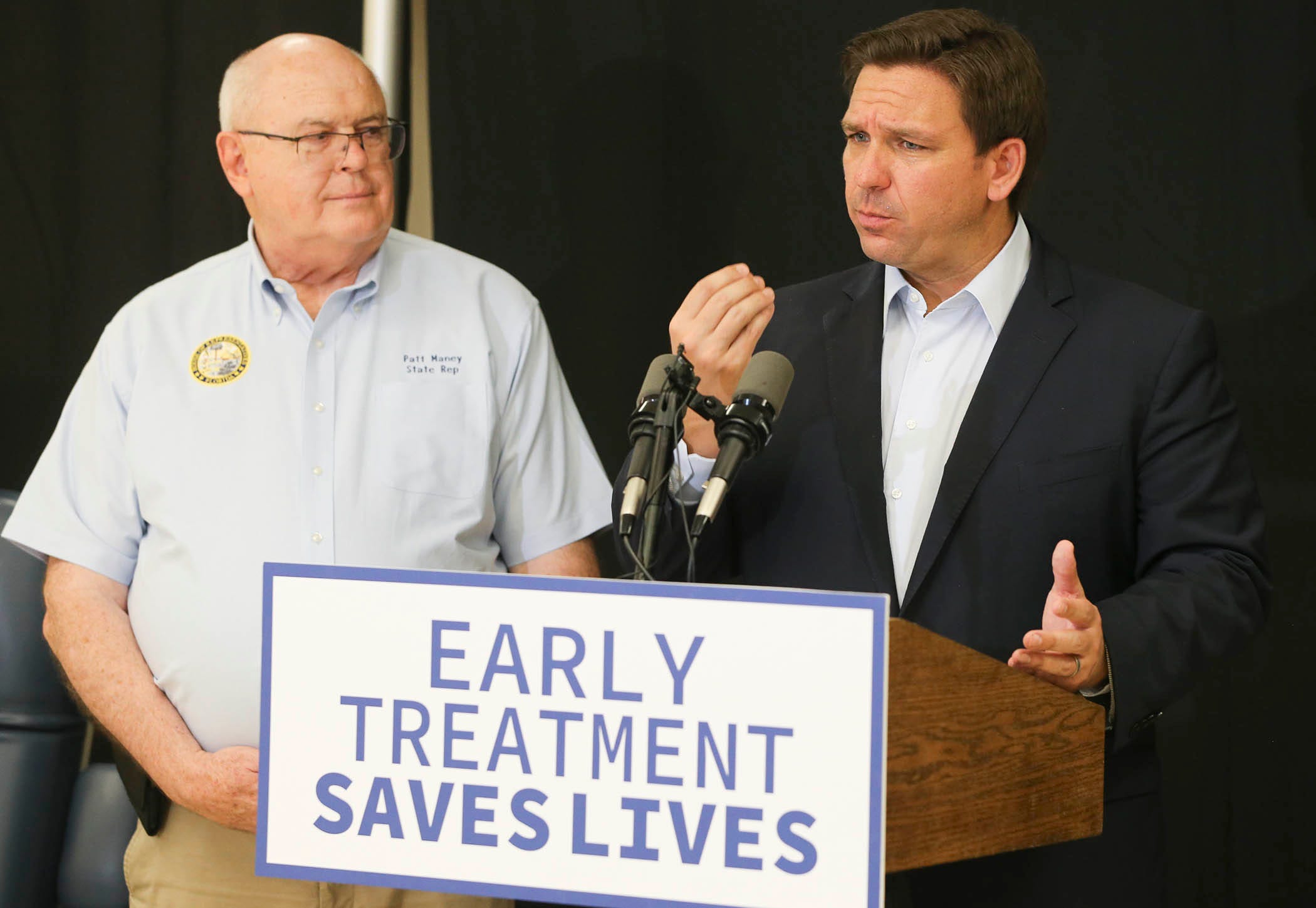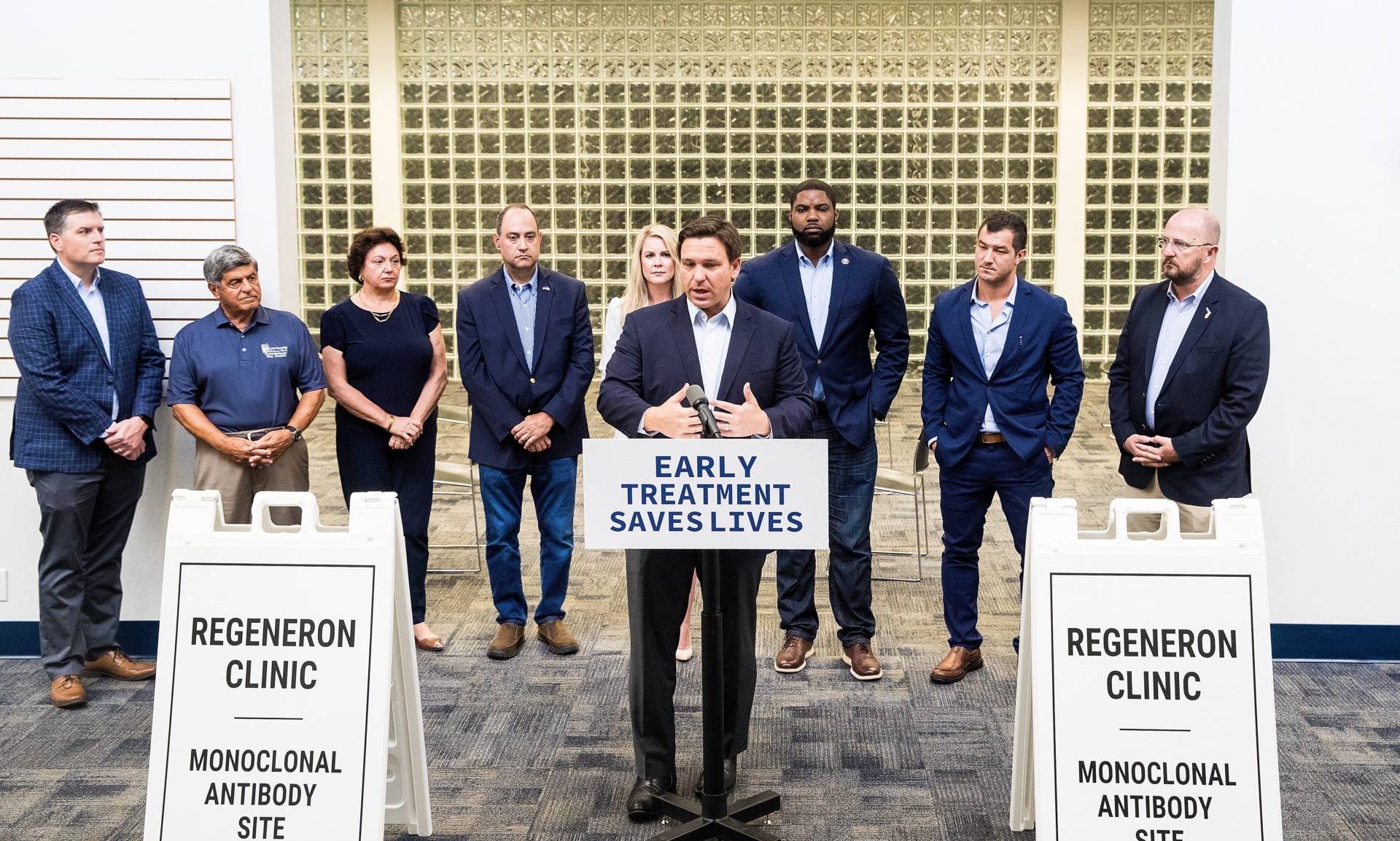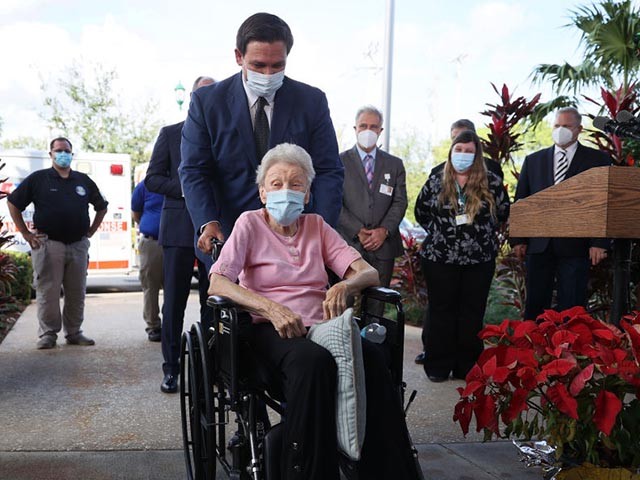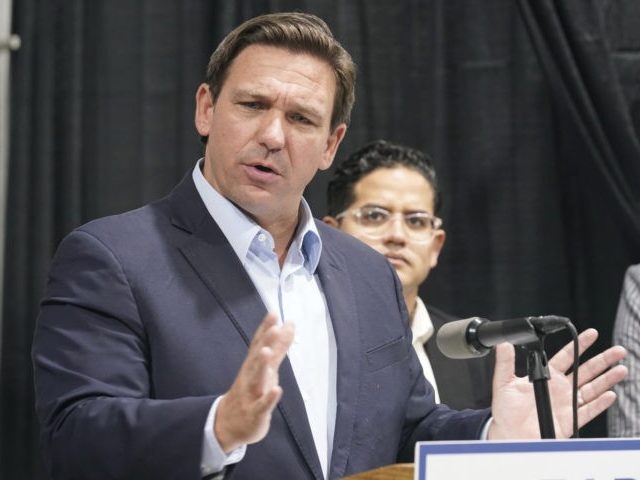Florida Gov. Ron DeSantis (R) on Monday penned a scathing letter to Associated Press (AP) president and CEO Daisy Veerasingham following the publication’s hit piece after the governor announced free coronavirus antibody treatment centers across the Sunshine State, blasting the outlet for attempting to advance a “false narrative that will lead some to decline effective” treatments for the Chinese coronavirus.
DeSantis, over the last week, has announced the openings of monoclonal antibody treatment sites across the Sunshine State.
“If you look at the people who are being hospitalized, the vast majority have not been vaccinated. But also, over 90 percent of the people admitted did not get a mono treatment after they were infected,” DeSantis explained.

Governor Ron DeSantis, along with Florida House Representative T. Patt Maney, announces that the State of Florida has opened a new monoclonal antibody therapy treatment site at the Northwest Florida Fairgrounds in Fort Walton Beach. This location will be the ninth state monoclonal antibody therapy treatment site to open. DeSantis Monoclonal Site. (MICHAEL SNYDER/DAILY NEWS via Imagn Content Services, LLC)
“It’s our belief based on the data, that if more people knew about this and would have done it, the admissions would have been lower and we think with more uptick on this, the admissions will go lower in the future,” he added.
During an event in Orlando, DeSantis said early treatment with monoclonal antibodies has been proven to “radically reduce the chances that somebody ends up being hospitalized.” And reducing hospital admissions, he added, stands as a top priority.
Over the past week, DeSantis has announced monoclonal antibody treatment sites across the state, including but not limited to Lee, Miami-Dade, Polk, and Manatee counties. But last week, the AP published an article attempting to make it sound as if DeSantis was only promoting the treatments because one of his top donors’ companies invested in it:
Citadel, a Chicago-based hedge fund, has $15.9 million in shares of Regeneron Pharmaceutical Inc., according to filings with the U.S. Securities and Exchange Commission. Citadel CEO Ken Griffin has donated $10.75 million to a political committee that supports DeSantis — $5.75 million in 2018 and $5 million last April.
Nonetheless, the AP admitted it is “not unusual for hedge funds to have a wide range of investments” and acknowledged that BlackRock “which has primarily donated to Democratic candidates, though has also donated substantially to Republicans, has a large holding in the company – more so than Citadel”:
Citadel’s investment in Regeneron is a tiny fraction of its overall $39 billion in investments, but if the stock price were to go up, Citadel would benefit. DeSantis spokeswoman Christina Pushaw points out that Citadel has far greater investments in Moderna and Pfizer, which manufacture COVID-19 vaccines.
DeSantis pushed back against the AP’s framing in a scathing August 23 letter directly to Veerasingham, identifying the outlet’s piece as a smear job “insinuating that Florida’s push to expand awareness of and access to monoclonal antibody treatments was done to boost Regeneron’s profit, rather than to simply help Floridians in need.”
“Indeed, as the federal government long ago bought the entire stock of Regeneron’s COVID monoclonal treatment, it is not even a plausible concept,” DeSantis wrote, blasting the AP for providing “zero evidence that Florida’s efforts are being undertaken for any reason other than to help Floridians recover from COVID.”

Florida Gov. Ron DeSantis held a press conference Friday, August 20, 2021 announcing a monoclonal antibody site at the old Bonita Springs Library. It is used to treat patients with COVID-19 Monoclonalinside. (Andrew West/The News-Press via Imagn Content Services, LLC).
“This will have real consequences for people’s health, especially given that the Regeneron monoclonal antibody treatment has a proven track record and has been touted by both the Trump and Biden administration,” he continued.
Calling the AP’s story a “baseless conspiracy theory” and noting the public’s distrust in corporate media outlets, DeSantis said there is “no doubt that some will decline to seek life-saving treatment as a result of the AP’s inflammatory headline.”
He continued:
That the AP has received vigorous pushback is something that should be expected given the brazenness of your political attack and the fact that your false narrative will cost lives. You cannot recklessly smear your political opponents and then expect to be immune from criticism. This is especially true when the effect of your false narrative jeopardizes the health of those who could otherwise benefit from treatment with monoclonal antibodies.
The AP’s “attempt to create a political narrative,” he continued, has “backfired,” and the credibility of the AP has been “further diminished.”
“This is what happens when you decide on the headline and narrative before you begin reporting,” the governor said.
“The corporate media’s ‘clicks-first, facts-later’ approach to journalism is harming our country,” he added.
“You succeeded in publishing a misleading, clickbait headline about one of your political opponents, but at the expense of deterring individuals infected with COVID from seeking life-saving treatment, which will cost lives,” DeSantis added, asking the AP, “Was it worth it?”
This is far from the first time the corporate media has presented false or negative narratives in regard to the Republican’s coronavirus response. In December, just as vaccine rollout began, CNN reported that DeSantis was “bucking” Centers for Disease Control and Prevention (CDC) guidelines for prioritizing seniors — one of the most vulnerable populations. Months later, 60 Minutes was exposed after deceptively editing comments made by DeSantis, hoping to hype a debunked “pay for play” vaccine distribution conspiracy.

Florida Gov. Ron DeSantis pushes Vera Leip, 88, in her wheelchair after she received a Pfizer-BioNtech COVID-19 vaccine at the John Knox Village Continuing Care Retirement Community. (Joe Raedle/Getty Images).
In an exclusive interview with Breitbart News in April, DeSantis blasted the corporate media, identifying them as lockdowners and noting that it remains obvious they “support blue state governors over red state governors.”
“You know it’s interesting. Because of the corporate media, they’ve had an anti-Florida narrative from the beginning. So if you’re somebody that lives in like New York City and all you do is read the New York Times and watch NBC and CNN, you would think Florida’s done like the worst,” he told Breitbart News, although he expressed hope that the “majority of the public sees through these narratives.”
Update: Information has been added from this AP story to the above article to provide additional perspective on Citadel’s investments.

COMMENTS
Please let us know if you're having issues with commenting.